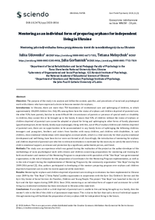Abstract
Objective: The purpose of the study is to analyze and define the content, specifics, and procedures of social and psychological work with citizens who have expressed a desire to become mentors for orphans.
Introduction: In Ukraine, there are more than 750 foundations of institutional care and upbringing of children, in which approximately 106,000 children live. Only 8% among them have the status of orphans and children deprived of parental care; the other 92% have parents, but due to some difficult life circumstances of parents or presence of special needs or disability in children, they cannot live or be brought up in the family. It means that 92% of children without the status of orphans or children deprived of parental care cannot be adopted or placed for living and upbringing to other forms of family placement (guardianship/care, foster family, family-type orphanage). Along with this, out of 8% of orphan children and children deprived of parental care, there are no opportunities to be accommodated in any family forms of upbringing the following children: teenagers and youngsters, brothers and sisters from families with many children, and children with disabilities. In such children, close emotional relationships with meaningful, constant adults, which is a vital necessity for their psycho-emotional development and well-being, have been lost or were not formed at all. Accordingly, the introduction of mentoring for orphans and children deprived of parental care who live in relevant institutions is motivated by the necessity to satisfy the need of every child in emotional support, assistance and protection by a significant, authoritative person, and friend.
Methods: The study uses an experience which was gained during the realization of the project as the author-developer of the methodology of socio-psychological work with citizens and children concerning preparations for mentoring and training for both coordinators and mentors of the Mentoring Program in cooperation with specialists of the “One Hope” non-governmental organization; in the role of educator for the preparation of coordinators for the Mentoring Program implementation, as well as in the role of expert during the implementation of Mentoring Program by the community organization “One Hope” during the 2009-2016 period [1]. Also, authors participated in developing of the mentors preparing program over orphans and children deprived of parental care in order to receive approval at the state level.
Results: Mentoring for orphans and children deprived of parental care residing in institutions has been implemented in Ukraine since 2009 by the “One Hope” (“Odna Nadia”) public organization in cooperation with the Kyiv City Children’s Service and the Kyiv City Center of Social Services for Families, Children and Young People. The project “One Hope” was launched in the city of Kyiv and the Kyiv region during 2009-2016. Since 2016, mentoring as an individual form of support and assistance for a child living in a residential institution has been introduced in Ukraine at the state level.
Conclusions: If an orphan child or a child deprived of parental care is unable to live and being brought up in a family, then the mentor’s role in the life of this child is of paramount importance. This is due to the fact that such a form of individual support through mentoring will facilitate the preparation of every orphan child for independent living in the future.

